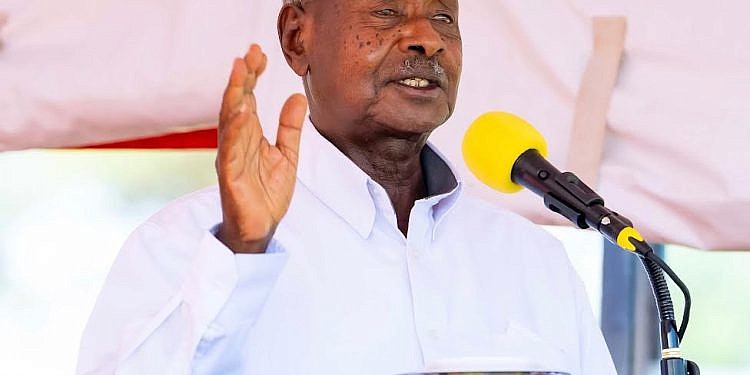President Yoweri Museveni has announced a strategic government initiative to address the long-standing developmental challenges in the Karamoja subregion, emphasising water accessibility, peace, and commercial agriculture as core pillars for transformation.
Speaking in Moroto District during a meeting with Karamoja leaders, Museveni underscored the importance of constructing dams, with a proposal for two dams per subcounty, to mitigate water scarcity that often forces pastoralists to trek long distances. This, he noted, leads to insecurity and cattle rustling, which hinder socio-economic progress.
“For me, I propose that in what you call the Karamoja strategic plan, a lot of emphasis be paid on dams, two per subcounty. Then we can add peace, mindset change, health, education, roads, and electricity,” Museveni stated.
The president revisited the genesis of the Karamoja Development Agency (KDA), established in 1987 with $6 million funding from the European Union. He expressed disappointment that its initial focus on water projects was diverted to other areas, resulting in limited progress.
Drawing from his personal experiences in North Ankole and Western Buganda, where communal dams supported livestock farming, Museveni urged leaders to prioritise water infrastructure in Karamoja. “Karamoja needs peace and water first,” he stressed.
The meeting in Moroto was part of Museveni’s three-day wealth creation and Parish Development Model (PDM) performance assessment tour in Karamoja. Leaders from the region’s ten districts, including Abim, Amudat, Nakapiripirit, Kotido, and Moroto, presented a memorandum highlighting key challenges such as high poverty and illiteracy rates, inadequate water, and poor road networks.
The President reaffirmed the government’s commitment to addressing these issues, integrating a large-scale dam construction program into the national development plan.
Agriculture as the cornerstone
Museveni reiterated the transformative role of commercial agriculture in Karamoja, advocating for its integration with other sectors like tourism and manufacturing. “When tourists come, what food will they eat? Let them drink Karamojong milk, eat local beef, mutton, and sausages. That is how agriculture supports other sectors,” he explained.
The President emphasised that peace and water were fundamental to enabling large-scale agricultural productivity, which would, in turn, support tourism and industrial activities.
Museveni highlighted the government’s financial contributions to water production in the subregion, amounting to Shs. 24 billion over the last four years. District-specific allocations include Shs. 721 million for Nabilatuk and Shs. 667 million for Amudat, among others.
In addition, the President revealed plans to construct a major airport in Karenga near Kidepo National Park, extend electricity to major towns, and improve road infrastructure to boost industrialisation.
National PDM Coordinator Ssozi Dennis Galabuzi reported that Shs. 85 billion out of the earmarked Shs. 98.8 billion had been disbursed to Karamoja. Napak District leads with 100% fund utilisation, while Kotido trails at 61%. Galabuzi identified extortion, insecurity, and fund diversion as major hurdles, vowing to enforce stricter oversight.
Local leaders raised concerns about bad weather affecting agricultural productivity and called for strategies to mitigate natural disasters. Galabuzi assured that funds for crops would be disbursed in January and June, aligning with weather patterns.
Leaders appealed for amnesty for 21 youths detained over cattle rustling, to which the President promised consideration. Additionally, Museveni launched Phase 5 of the National Backbone Infrastructure project, extending internet access across Karamoja, funded by the Chinese government.
Vice President Jessica Alupo lauded Museveni’s efforts to integrate Karamoja into the money economy through initiatives like the PDM. The President emphasised that sustainable wealth creation requires a focus on four sectors: commercial agriculture, industry, services, and ICT.
He highlighted success stories, such as Joseph Ojara from Teso, who transitioned from a taxi conductor to a farmer earning over Shs. 1 billion annually. “Let us concentrate on wealth creation. We shall deal with all the other issues,” Museveni said.







































